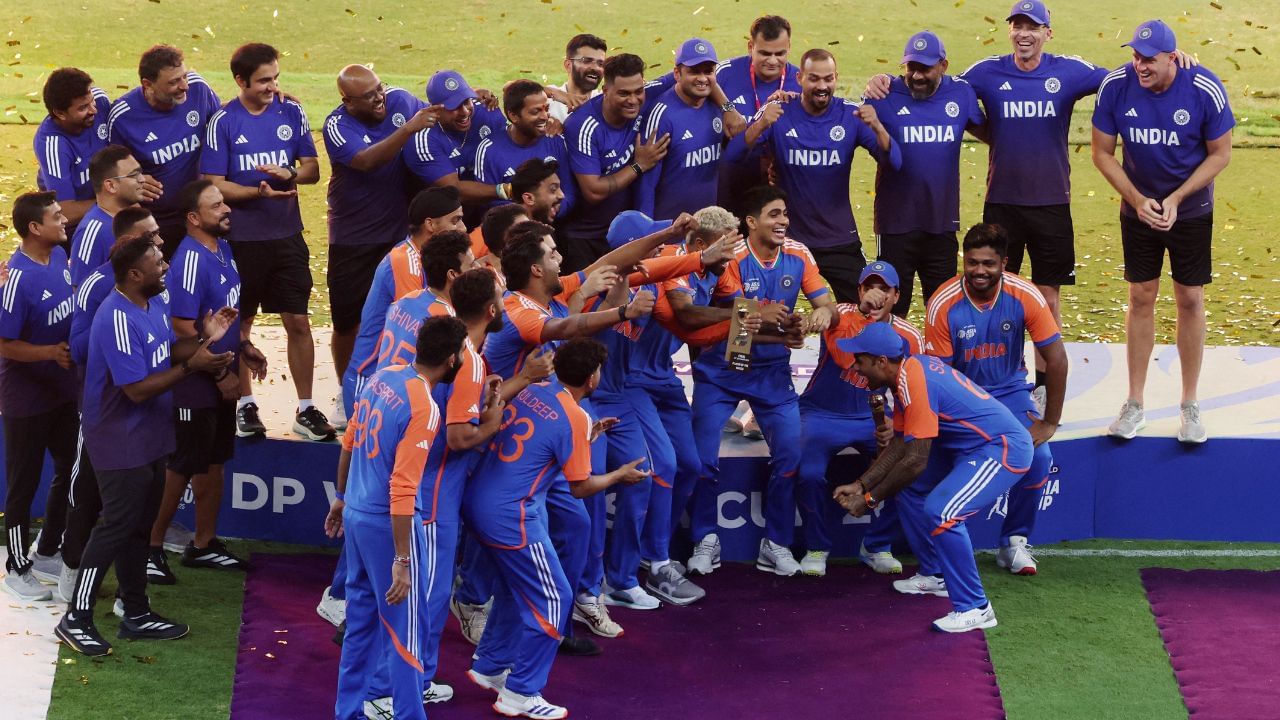New Delhi: India’s dramatic five-wicket triumph over Pakistan in the Asia Cup 2025 final could have ended in pure celebration, but instead it concluded in confusion, conflict and a rare sight in international cricket. This was the first time that the champions walked away without the trophy. The moment that should have been about glory became a flashpoint for politics and principle.
After a commanding performance throughout the tournament, India lifted their ninth Asia Cup title but refused to accept the trophy from Asia Cricket Council (ACC) President and Pakistan Cricket Board (PCB) Chairman Mohsin Naqvi, who also serves as Pakistan’s Interior Minister.
That made the situation even more uncomfortable than it already was. Indian cricketers stood their ground and refused to accept the silverware from a man known for his strong political stance against India.
Pakistani Mohsin Naqvi was waiting for the Indian players to come on stage to collect the trophy,
While Indian players were busy watching Instagram reels and reading Space Recorder tweets on the ground
🤣🤣 pic.twitter.com/GCC1SDTUD1
— Frontalforce 🇮🇳 (@FrontalForce) September 29, 2025
Why did India refuse to accept the trophy?
The refusal came down to one thing – politics on the podium. India didn’t say they didn’t want the trophy; they simply stated that they would not like to receive it from Mohsin Naqvi amid heightened bilateral tensions. Naqvi, a Pakistani cricket administrator and a politician, had earlier shared a politically charged post after the Super Four clash, which Haris Rauf further fuelled with his comments.
According to reports, Naqvi eventually took the trophy back with him after the ceremony was delayed by nearly an hour, leaving the image of India’s victory incomplete.
🚨MOHSIN NAQVI HAS LEFT THE GROUND WITH ASIA CUP TROPHY AFTER INDIA REFUSED TO TAKE FROM HIM 🤯#INDvPAK #indvspak2025 #IndianCricket #INDvsPAK #PAKvsIND pic.twitter.com/Lf61pr5XRD
— RK Azlaan FCB (@Azlaan_FCB) September 28, 2025
The Board of Control for Cricket in India (BCCI) has since maintained that the team’s stance was justified, citing political sensitivities. The board is also expected to take up the matter formally with the International Cricket Council (ICC) and the ACC to ensure the trophy is handed over under suitable circumstances.
What the ICC Code of Conduct says
Even if the trophy isn’t received on stage, the winning team remains the rightful owner. The runners-up in this case, Pakistan, cannot claim it. The responsibility now lies with the tournament organisers to safeguard the trophy and hand it over to India once the issue is settled.
However, the ICC’s Code of Conduct could still come into play. While there’s no specific clause about refusing a trophy, such actions can be viewed as going against the “spirit of cricket.” That doesn’t automatically mean punishment, but depending on how the incident is assessed, a formal warning or fine is possible.
Can there be consequences?
Under ICC guidelines, anything that damages the image of the sport can invite scrutiny. Trophy presentations are symbolic moments as they represent sportsmanship, unity and respect for the game. When those moments break down, questions are bound to follow.
But context matters. In this case, India’s decision wasn’t made in anger or arrogance rather as a matter of national principle that’s likely to weigh in any review. As one BCCI official reportedly said, “No team should be forced to accept a trophy from someone representing a hostile government.”
What happens next?
In the coming weeks, the BCCI is expected to provide a formal explanation to the ACC and ICC. Once clarity emerges, the trophy will likely be handed over privately or during a separate ceremony. Until then, it remains in the custody of the tournament organisers. Though the backdoor talks might be ongoing and India might receive the trophy without such an act.
For now, India may not have the silverware in their cabinet, but their triumph and the message behind it are already etched in cricket history.
